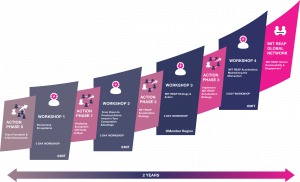MIT REAP. Translate. Convene. Educate. Impact.
We achieve our mission by translating research insights into practical frameworks, convening stakeholders focused on innovation-driven entrepreneurship (IDE), and educating regional leaders through team-based interaction to achieve economic and social progress.
Translate research and expertise into practical frameworks, approaches and actions with widespread global applications.
Convene stakeholders (corporate, risk capital, entrepreneur, university and government) from ecosystems around the world to build a community for collaboration and learning.
Educate regional innovation ecosystem leaders through team-based learning to facilitate meaningful economic and social outcomes.
Impact regions through the development of new programmatic and policy interventions that build on strengths and support weaknesses to support IDEs.
Mechanisms to Learn and Engage:
Translate: Case studies, frameworks, podcasts, videos, regional write-ups.
Convene: Conferences, workshops, MIT REAP Global Network, webinars.
Educate: Two-year program for regions who engage as teams (representing key stakeholders).
Partner regions form multi-disciplinary teams and commit to a two-year learning engagement with MIT. During this engagement, teams work with world-renowned MIT faculty and the broader MIT REAP community through a series of action-learning activities to build and implement a custom regional strategy for enhancing their IDE ecosystems. Further details are also available in the MIT REAP brochure and program overview.
Who?
MIT REAP admits up to 8 partner regions annually to participate in the two-year engagement. A typical MIT REAP region has a population of 1-10 million people. Each partner region has a team comprised of 5-8 highly driven and influential regional members and is headed by a regional team champion. All five major stakeholder groups are represented in an MIT REAP team: government, corporate, academia, risk capital, and the entrepreneurial community. All team members must speak English fluently to participate in the workshops.
Stakeholder Model

Every team that participates in the program must have a representative from each of the five stakeholder categories.
Why?
During this two-year engagement, regional teams are empowered to:
- Deploy MIT rigor and use data-driven frameworks to deepen analysis and evaluate their current entrepreneurial ecosystems
- Catalyze action through the development of a common agenda and set of shared measurements to support the construction and implementation of a strategic framework for driving regional IDE impact
- Leverage understanding of key drivers of successful IDE ecosystems to design and implement key programs and policies
- Share best practices from world-renowned MIT faculty and partner regions
- Build bridges internally across regional stakeholders to drive regional strategy development and implementation
- Exchange ideas externally with partner regions and the MIT REAP community
- Cultivate a global community of regions and individuals interested in ecosystem development
Strategic Interventions

Each team determines one or more strategic interventions to implement during the 2-year program, as well as metrics to measure the impact of that programmatic or policy intervention.
How?
MIT REAP involves four action-based learning cycles over a two-year period. These cycles involve highly interactive workshops every 6-9 months, which are interspersed by action phases:
- Throughout the program, there are 4 workshops. A typical workshop is 3 days and consists of lecture & discussion, case study analysis, ecosystem engagement tours, programmatic deep dives, group work report-outs, and preparation for action phases. Three workshops are hosted at MIT, and one workshop is hosted by a selected partner region.
- Action phases are active time between workshops during which teams return home to deepen their analysis, validate assumptions with a broad network, and implement new programs and policies. There are 4 Action Phases over the course of the program. See here for an example program launched.
Program Structure

MIT REAP 2-year overview of action-based learning cycles.


